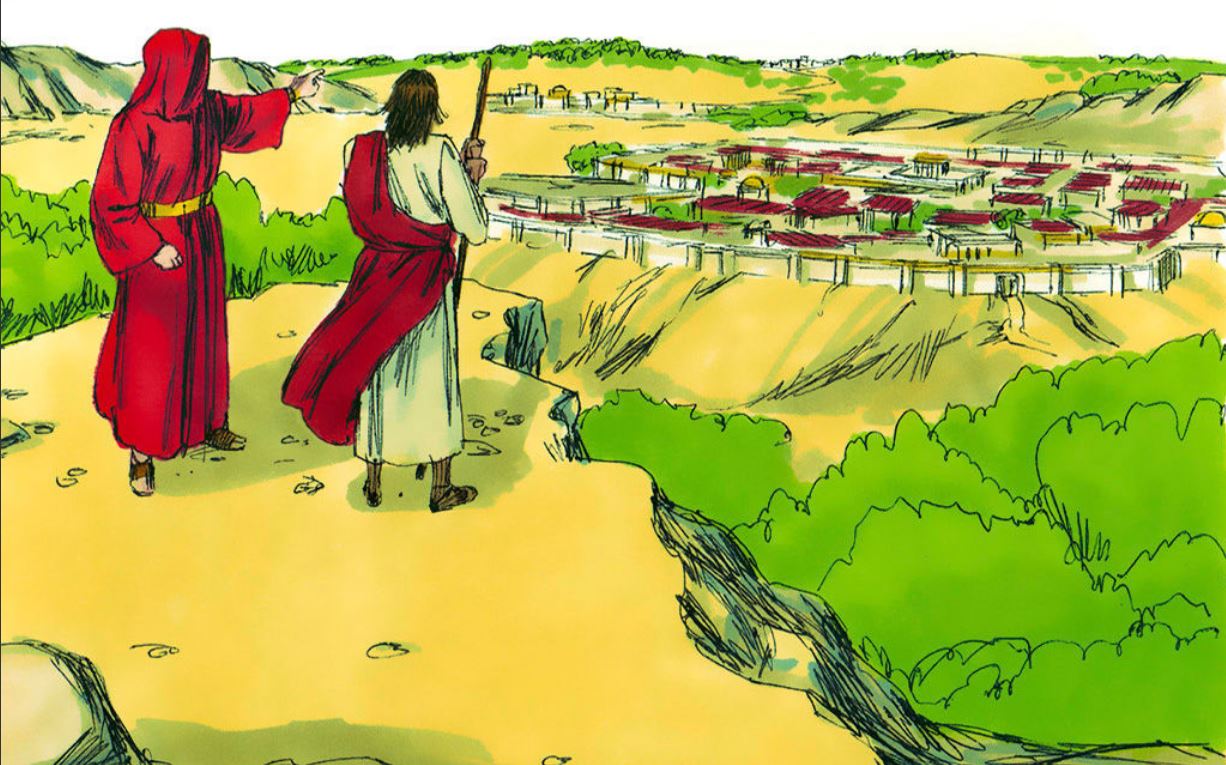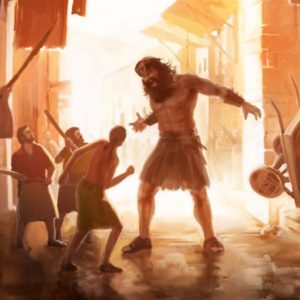The Divine Council is a council of divine beings who live with and serve Yahweh. The Bible refers to them as “elohim” in Hebrew and “gods” in English translations. They make decisions with God on what to do in the human world, as is evident in cases such as 1 Kings 22 where God asks his heavenly host how he should entice Ahab to go up and fall at Ramoth-Gilead. One says one thing, another says another, and then finally one comes along and tells Yahweh that will entice Ahab by being a lying spirit in the mouths of all his prophets. Of course, it’s not as though God didn’t know the correct course of action and needed to brainstorm with created beings to figure it out. Rather, he allowed the divine council to participate in the decision. God, being omniscient, would know which plans would work and which ones wouldn’t, and he would turn down bad ideas. Other obvious divine council settings in scripture are Psalm 82 and Job 1 and 2. I talk a lot about these passages and how Psalm 82, in particular, ties in with Deuteronomy 32:8 and Genesis 11. In Psalm 82, “God takes his place in the midst of the gods” and judges these gods as being corrupt and judging and ruling the nations wickedly. He then pronounces “You are gods, sons of The Most High, all of you. Nevertheless you will die like men and fall like any prince.” In Deuteronomy 32:8-9, we read that “When the Most High gave to the nations their inheritance, when he divided mankind, he fixed the borders of the peoples according to the number of the sons of God.” When did God divide mankind and fix their borders? At The Tower of Babel event in Genesis 11, of course. And what did God do? He gave the nations their inheritance according to the number of the sons of God. Who are the sons of God? Well, Psalm 82 makes it pretty clear; they are heavenly divine beings. They are (or rather, were) members of Yahweh’s divine council. Interestingly enough, Psalm 82 links to Deuteronomy 32:8 and Genesis 11. These sons of God didn’t rule the nations they were allotted justly. They became corrupt and lead people to worship them rather than their Creator, taking on the persona of the pagan gods of the nations such as Baal, Asherah, Marduk, Dagon, etc. (see Deuteronomy 4:19–20, Deuteronomy 32:16-17, 1 Corinthians 10:20).
God gave the nations over to fallen elohim/ex divine council members who would enslave them into pagan worship. However, God loves the world (John 3:16), and wants all people to be saved (1 Timothy 2:4), so he would not abandon them forever. This is part of what the death and resurrection of Jesus accomplished. Jesus didn’t die only to atone for our sins, but to release the gentiles from the power of the pagan gods. Check out my paper “Genesis 10-11: The Tower Of Babel, The Fall Of The gods, and The Divine Council Worldview” for a more in depth treatment on this subject.
With all of this said, there are places where the theological and historical facts summarized above show up in very implicit ways elsewhere in The Bible. Let’s take a look at those.
1: Why Did Naaman Want To Take Dirt Home?
The first example of this nation-allotment-to-the-gods theology that might escape your attention is in The Old Testament, in 2 Kings.
In 2 Kings 5:1-19, we read
Naaman, commander of the army of the king of Syria, was a great man with his master and in high favor, because by him the Lord had given victory to Syria. He was a mighty man of valor, but he was a leper. Now the Syrians on one of their raids had carried off a little girl from the land of Israel, and she worked in the service of Naaman’s wife. She said to her mistress, “Would that my lord were with the prophet who is in Samaria! He would cure him of his leprosy.” So Naaman went in and told his lord, “Thus and so spoke the girl from the land of Israel.” And the king of Syria said, “Go now, and I will send a letter to the king of Israel.”
So he went, taking with him ten talents of silver, six thousand shekels of gold, and ten changes of clothing. And he brought the letter to the king of Israel, which read, “When this letter reaches you, know that I have sent to you Naaman my servant, that you may cure him of his leprosy.” And when the king of Israel read the letter, he tore his clothes and said, “Am I God, to kill and to make alive, that this man sends word to me to cure a man of his leprosy? Only consider, and see how he is seeking a quarrel with me.”
But when Elisha the man of God heard that the king of Israel had torn his clothes, he sent to the king, saying, “Why have you torn your clothes? Let him come now to me, that he may know that there is a prophet in Israel.” So Naaman came with his horses and chariots and stood at the door of Elisha’s house. And Elisha sent a messenger to him, saying, “Go and wash in the Jordan seven times, and your flesh shall be restored, and you shall be clean.” But Naaman was angry and went away, saying, “Behold, I thought that he would surely come out to me and stand and call upon the name of the Lord his God, and wave his hand over the place and cure the leper. Are not Abana[c] and Pharpar, the rivers of Damascus, better than all the waters of Israel? Could I not wash in them and be clean?” So he turned and went away in a rage. But his servants came near and said to him, “My father, it is a great word the prophet has spoken to you; will you not do it? Has he actually said to you, ‘Wash, and be clean’?” So he went down and dipped himself seven times in the Jordan, according to the word of the man of God, and his flesh was restored like the flesh of a little child, and he was clean.
Then he returned to the man of God, he and all his company, and he came and stood before him. And he said, “Behold, I know that there is no God in all the earth but in Israel; so accept now a present from your servant.” But he said, “As the Lord lives, before whom I stand, I will receive none.” And he urged him to take it, but he refused. Then Naaman said, “If not, please let there be given to your servant two mule loads of earth, for from now on your servant will not offer burnt offering or sacrifice to any god but the Lord. In this matter may the Lord pardon your servant: when my master goes into the house of Rimmon to worship there, leaning on my arm, and I bow myself in the house of Rimmon, when I bow myself in the house of Rimmon, the Lord pardon your servant in this matter.” He said to him, “Go in peace.”
So we have a Syrian commander named Naaman who is suffering from leprosy, a little girl who has been taken to Syria from Israel in a raid to become a servant suggests he go to the prophet Elisha to be healed, and he does so. At first, he is offended by Elisha not coming out. Namaan is a high ranking Syrian officer after all, Elisha should show some respect, right? So Naaman is like “To Sheol with this. I’m going home.” but his servants say to him in a nutshell “Hey, he told you to wash in the Jordan. You should at least try it. Can’t hurt, right?” But what might strike some readers as odd is Naaman’s request to Elisha to take dirt home with home. Why in the world would he want to do that? And especially as much dirt as his camels can carry!
In his book “I Dare You Not To Bore Me With The Bible”, Michael Heiser explains that “The dirt and Naaman’s new allegiance to the God of Israel are related. Naaman was a man with significant duties in his home country. He couldn’t stay in Israel, but he could take Israel with him. Why would he want to? Naaman’s unusual request stems from the ancient—and biblical—conception that the earth is the locale for a cosmic turf war. Naaman wanted dirt from Israel because Israel was Yahweh’s territory. The dirt which is Yahweh’s domain is holy ground. …. the idea derives from Deuteronomy 32:8–9 …where we learn that when God divided up the nations at the Tower of Babel, they were allotted to ‘the sons of God.’ The nations of the world were, in effect, disinherited by Yahweh as His own earthly family. Immediately after Babel, Yahweh called Abraham and the nation of Israel was created. Israel was, therefore ‘Yahweh’s portion’ (Deut 32:9), whereas all the other nations belong to the sons of God whom Israel was forbidden to worship. As a result, Israel was holy ground; the territory of every other nation was not.”1
2: Why Did Satan Think He Could Give Jesus The Whole World?
One of the things that used to puzzle me as I read The New Testament was the narrative in Matthew 4 where Satan is tempting Jesus in the wilderness after Jesus had fasted for 40 days. At one point, “The devil took him to a very high mountain and showed him all the kingdoms of the world and their glory. And he said to him, ‘All these I will give you, if you will fall down and worship me.'” (verses 8-9). Jesus doesn’t convert to Satanism and instead rebukes him with “Be gone, Satan! For it is written, ‘You shall worship the Lord your God and him only shall you serve.'” (verse 10)
What always struck me as odd is that Satan thought he owned the world and thought that, therefore, he had something to bargain Jesus with. But isn’t Jesus God? That’s what John 1, Colossians 1, Hebrews 1, John 10:30 and a whole host of other biblical passages teach. Jesus is The Lord, and “The Earth is the Lord’s and everything in it” (Psalm 24:1). So Jesus already own the world! Satan is offering Jesus something he already owns! Is Satan really that stupid?
Well, if you’ve studied the history of The Roman Empire, you’ll know that by the first century, Rome had conquered a massive portion of the ancient world. The Roman Empire ruled all of Israel, all of Italy, Britain, Arabia, Armenia, Assyria, Mesopotamia, Asia, and more. 2 Pretty much every place the ancients knew about at that time. The people in that time and place didn’t know about North and South America or China. For them, Rome ruled over the entire world. The king of Rome’s pantheon was the sun god Apollyon. Why is this Roman sun god important? Well according to Smith’s Bible Dictionary, “Apollyon or, as it is literally in the margin of the Authorized Version of ( Revelation 9:11 ) ‘a destroyer,’ is the rendering of the Hebrew word ABADDON, ‘the angel of the bottomless pit.’ From the occurrence of the word in ( Psalms 88:11 ) the rabbins have made Abaddon the nethermost of the two regions into which they divide the lower world; but that in ( Revelation 9:11 ) Abaddon is the angel and not the abyss is perfectly evident in the Greek.”3
GotQuestions.org says “In Revelation 8–9, John describes a period during the end times when angels sound seven trumpets. Each trumpet signals the coming of a new judgment on the people of earth. When the fifth angel blows his trumpet, the Abyss, a great smoking pit, will open, and a horde of demonic ‘locusts’ will rise out of it (Revelation 9:1-3). These creatures will be given the power to torture any person who does not bear God’s seal (verse 4). The pain they inflict will be so intense that sufferers will wish to die (verse 6). Abaddon/Apollyon is the ruler of the Abyss and the king of these demonic locusts.
Abaddon/Apollyon is often used as another name for Satan. However, Scripture seems to distinguish the two. We find Satan later on in Revelation, when he is imprisoned for 1,000 years (Revelation 20:1-3). He is then released to wreak havoc on the earth (verses 1-8) and ultimately receives his final, eternal punishment (verse 10). Abaddon/Apollyon is likely one of Satan’s underlings, a destroying demon and one of the ‘rulers,’ ‘authorities,’ and ‘powers’ mentioned in Ephesians 6:12.”4
The biblical authors identified this pagan sun god the Romans called Apollyon with the biblical devil. GotQuestions.org notes that Apollyon could be an underling of Satan, since it seems like the two are treated seperate beings. Although in the ancient world, a subordinate’s act on behalf of the master was often spoken of as though the master himself did it. Whether Satan is Apollyon or merely is Apollyon’s master, the point can be made either way. I’m inclined to think they’re one and the same though.
Based on what we know about the fallen sons of god taking on deity personas and drawing worship to themselves (see Deuteronomy 4:19–20, Deuteronomy 32:16-17, 1 Corinthians 10:20) and that these beings were given the 70 nations at the Babel event (Genesis 10-11 cf. Deuteronomy 32:8), a good inference can be made that the god the Romans worshipped was actually Satan! Now, given that Apollyon is Satan, Apollyon is the chief god of Rome, and Rome ruled “all the kingdoms of the world”, now it makes sense why, in Matthew 4, Satan believed he himself owned the kingdoms of the world.
It also explains why this would have been a temptation to Jesus. That offer; inheriting the nations, was exactly why He came to Earth. Rather than go to the cross to suffer and die, all Jesus would need to do is pay the god Apollyon a little bit of homage and he would relinquish it all into His hands. No scourging, no being nailed to a cross, just a little “Hail Satan” and it would be over with. Jesus didn’t give in. Jesus did not take the easy way out, for to do so would be idolatry (Exodus 20:3).
3: Pentecost – The Reversal Of Babel
Acts 2:1-15 says
When the day of Pentecost came, they were all together in one place. Suddenly a sound like the blowing of a violent wind came from heaven and filled the whole house where they were sitting. They saw what seemed to be tongues of fire that separated and came to rest on each of them. All of them were filled with the Holy Spirit and began to speak in other tongues as the Spirit enabled them.
Now there were staying in Jerusalem God-fearing Jews from every nation under heaven. When they heard this sound, a crowd came together in bewilderment, because each one heard their own language being spoken. Utterly amazed, they asked: “Aren’t all these who are speaking Galileans? Then how is it that each of us hears them in our native language? Parthians, Medes and Elamites; residents of Mesopotamia, Judea and Cappadocia, Pontus and Asia, Phrygia and Pamphylia, Egypt and the parts of Libya near Cyrene; visitors from Rome (both Jews and converts to Judaism); Cretans and Arabs—we hear them declaring the wonders of God in our own tongues!” Amazed and perplexed, they asked one another, “What does this mean?”
Some, however, made fun of them and said, “They have had too much wine.”
Then Peter stood up with the Eleven, raised his voice and addressed the crowd: “Fellow Jews and all of you who live in Jerusalem, let me explain this to you; listen carefully to what I say. These people are not drunk, as you suppose. It’s only nine in the morning!
Many of Genesis 10’s Table of Nations are mentioned as being in Jerusalem at Pentecost. What we have here is a reversal of The Tower Of Babel event. I mean, just look at both historical accounts! In Genesis 11, God confused the tongues of the people so that no one could understand each other, and ergo, they could no longer continue building their tower to summon God or gods down to do their bidding. In Acts 2, we have God clarifying the tongues of the people so that everyone from all over the world can understand what the apostles were preaching in that moment. In Genesis 11, God disinherited the nations and gave them over evil lesser gods. In Acts 2, God calls the peoples of the nations home.
After Peter told the hecklers that they weren’t drunk, he quoted from the book of Joel. “In the last days, God says, I will pour out my Spirit on all people. Your sons and daughters will prophesy, your young men will see visions, your old men will dream dreams. Even on my servants, both men and women, I will pour out my Spirit in those days, and they will prophesy.” (Acts 2:17-18)
The events of Pentecost were the beginning of a reversal of what happened at The Tower Of Babel. After this, the apostles would go on to fulfill the great comission of making disciples of all the disinherited nations (Matthew 28:19). Jesus had told them in Acts 1 to wait until The Holy Spirit came upon them, and now that He had done so in a spectacular way; reclaiming the nations from the power of evil gods was underway.
——————————
NOTES
1: Michael S. Heiser. I Dare You Not to Bore Me with the Bible (Kindle Locations 740-756). Lexham Press. Kindle Edition.
2: See “The Extent Of The Roman Empire” by Donald L Wasson, January 5th, 2016, — https://www.ancient.eu/article/851/the-extent-of-the-roman-empire/
3: https://www.biblestudytools.com/dictionaries/smiths-bible-dictionary/apollyon.html





